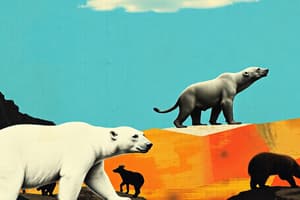Podcast
Questions and Answers
What is a potential consequence for species that cannot migrate due to human development?
What is a potential consequence for species that cannot migrate due to human development?
- Increased reproductive rates
- Extinction (correct)
- Adaptation to new habitats
- Fusion with neighboring species
What percentage of species could potentially face extinction with a temperature increase of 2 to 3 Celsius degrees?
What percentage of species could potentially face extinction with a temperature increase of 2 to 3 Celsius degrees?
- 10 to 20 percent
- 50 to 70 percent
- 70 to 90 percent
- 20 to 50 percent (correct)
Which ecosystems are particularly vulnerable to changes caused by global warming?
Which ecosystems are particularly vulnerable to changes caused by global warming?
- Urban ecosystems
- Savannahs
- Grasslands
- Coral reefs (correct)
What effect does increasing carbon dioxide in ocean waters have?
What effect does increasing carbon dioxide in ocean waters have?
Which changes have scientists observed in the life cycles of some plants and animals due to global warming?
Which changes have scientists observed in the life cycles of some plants and animals due to global warming?
Flashcards
Species Migration
Species Migration
The process of animals and plants relocating to cooler areas due to rising temperatures caused by global warming.
Migration Barriers
Migration Barriers
Areas where human development blocks the natural migration paths of species, leading to potential extinction.
Ocean Ecosystems
Ocean Ecosystems
The delicate balance of life in the ocean that is particularly susceptible to changes in temperature and acidity caused by global warming.
Ocean Acidification
Ocean Acidification
Signup and view all the flashcards
Species Extinction
Species Extinction
Signup and view all the flashcards
Study Notes
Impacts of Global Warming on Plants and Animals
- Plants and animals struggle to adapt to global warming effects.
- Shifts in life cycles are already observed, like earlier flower blooms and bird hatchings.
- Species migration patterns are changing due to warming temperatures. Animals migrate to higher altitudes and toward the poles. Plants seek new ranges.
- Human development often prevents species' shifts, creating barriers to migration. This can lead to extinction risks.
- Unique ecosystems make species vulnerable as migration to new habitats is not possible.
- Extinction projections due to warming are challenging.
- Some estimate 20-50% species extinction risk after 2-3°C warming.
- Some species and ecosystems cannot adapt quickly and may disappear.
Ocean Ecosystem Impacts
- Ocean ecosystems are vulnerable to global warming.
- Even a 1°C increase could lead to widespread coral bleaching and death.
- Atmospheric carbon dioxide increases ocean acidity, stressing ocean ecosystems further.
Studying That Suits You
Use AI to generate personalized quizzes and flashcards to suit your learning preferences.




